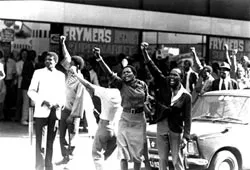
Across Africa, September 1 has long been a date marked by political upheaval, military campaigns, and defining moments that have shaped the continent’s modern history.
From independence struggles to coups and colonial conquests, the day carries the weight of transformative events stretching over a century.
In Eritrea, September 1, 1961, marked the beginning of the armed struggle for independence when Hamid Idris Awate and a small group of Eritrean Liberation Front (ELF) fighters launched an attack on Ethiopian imperial forces in the Battle of Adal.
This action, staged in the Gash-Barka region, triggered a three-decade war for self-determination, following the gradual dismantling of Eritrea’s autonomy and its annexation by Ethiopia.
On the same date in 1969, Libya witnessed a bloodless coup as Captain Muammar Gaddafi and his Free Officers deposed King Idris I.
Launched from Benghazi and swiftly extending to Tripoli, the overthrow led to the creation of the Libyan Arab Republic, breaking with a monarchy perceived as overly Western-aligned.
September 1 also holds significance in Sudanese history. In 1898, Anglo-Egyptian forces under General Herbert Kitchener advanced to the outskirts of Omdurman, confronting the Mahdist army.
This maneuver set the stage for the decisive battle a day later, which reasserted colonial control and restored Anglo-Egyptian influence in the region.
Elsewhere in West Africa, Ouagadougou, the Mossi kingdom’s capital, fell to French troops led by Paul Voulet and Julien Chanoine on September 1, 1896.
This marked a key moment in France’s colonial expansion, gradually subjugating local rulers and consolidating its empire.
In South Africa, September 1, 1900, saw British Commander-in-Chief Lord Roberts proclaim the annexation of the Transvaal during the Second Boer War, igniting a prolonged phase of guerrilla resistance.
Cameroon’s history also shifted on this date in 1966, when President Ahmadou Ahidjo established the Cameroon National Union as the country’s sole political party.
The move, framed as a bid for unity in a tense post-independence period, further centralized power.
More recently, on September 1, 2016, Gabon experienced violent unrest following the disputed re-election of President Ali Bongo.
Riots erupted in Libreville and other cities as opposition supporters clashed with security forces, fires broke out, and the government imposed an internet blackout, exposing deep political and social fractures.
From independence battles to modern political crises, September 1 remains a day etched into Africa’s complex and often turbulent history.



